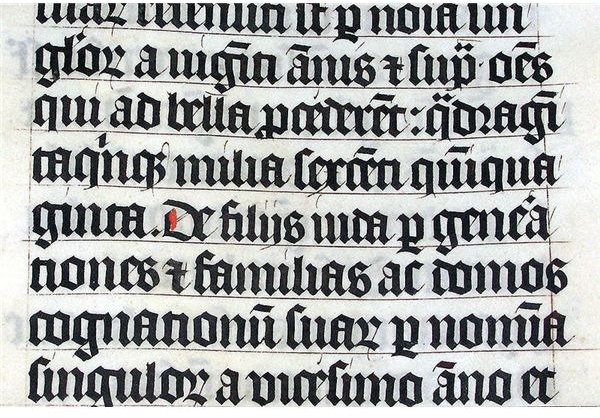Understanding Latin Definite and Indefinite Articles
English speakers often find Latin a difficult language to learn for many reasons. Most notable is the fact that Latin is an inflected
language, which means that Latin words change to indicate their use in a sentence. Therefore, word order in Latin is far less important than in English. In fact, many authors writing in Latin would change the order of words in a sentence to emphasize certain words over others. Most of the time the verb of a Latin sentence comes at the end- almost like a punch line. But the use of inflections makes articles largely unnecessary. Students must use context and good sense to know whether a definite or indefinite article is appropriate when translating from Latin to English.
An article is simply a word that is used before a noun to indicate whether the noun refers to a specific person, place, thing, idea, or idea or whether it refers to a non-specific noun. The most common articles in English are “the” and “a”. The former is the definite article and the latter the indefinite.
English Articles
An article is used to specify whether a noun is specific or if it refers to any person, place, idea, etc.. If the noun is a specific noun, “the” is usually used as in:
The book is on the chair.
“The” indicates that a specific book, not just any book is on the chair. Of course, without any further information than that given in the sentence, which specific book is referred to is unknown. Previous or subsequent sentences would have to reveal that information. However, the reader does know that the writer of the sentence is referring to a specific book.
“A” is an indefinite article and indicates an non-specific noun such as:
A book is on the chair.
Since “a” is used, the book may be any book, not a specific one. When the first letter of a noun to which an indefinite article refers is a vowel, “an” is used in place of “a” as in.
An egg is on the counter
Use of definite and indefinite articles is so natural to English speakers that they are hardly given a second thought. The difficulty of learning English articles is apparent when listening to a non-native English speaker speak English. Often, they mix up the use of articles and sometimes forget them altogether. This is because English is one of those uncommon languages that uses articles to refer to specific and non-specific nouns.
Articles in Latin
Latin does not use articles. When translating a sentence from Latin to English, the Latin student must provide them him/herself using only context and logic to determine whether a definite or indefinite article is more appropriate. The Latin student has only his/her knowledge of English to aid in this decision. Take the Latin sentence below:
Puer puellae rosam dat.
This sentence translated literally into English would be:
Boy to girl rose he is giving.
This sentence does not follow proper English grammar but again, this is a literal translation. With a lack of definite and indefinite articles, the Latin student would be correct in translating this sentence in any of the following ways:
A boy is giving a rose to a girl
A boy is giving a rose to the girl
A boy is giving the rose to a girl
A boy is giving the rose to the girl
The boy is giving a rose to a girl
The boy is giving a rose to the girl
The boy is giving the rose to a girl
The boy is giving the rose to the girl
Without any further information on the three nouns in the sentence (boy, girl, and rose), there is no way of knowing whether these nouns are definite or indefinite.
Latin does, on occasion, provide a method of specifying a definite noun. The word “that” or “ille” in Latin can be used to refer to a specific noun. Alexander Lenard’s Latin translation of A. A. Milne’s famous Winnie the Pooh is familiar to many elementary Latin students. Translation of the title yields:
Winnie Ille Pu
“Ille” is a way of specifying a definite noun. Literally, “ille” is translated as “that” but the connection between “the” and “that” is quite obvious to an English speaker. Winnie Ille Pu refers to Winnie “that” Pooh. Not just any Pooh but “that” Pooh. However, “ille” is only used occasionally. Normally context and common sense are the only weapons in a student’s arsenal in determining the proper article. Lack of more information leaves it up to the student to decide.
Summing It Up
Latin lacks the definite and indefinite articles so common in English. Native English speakers have a hard time coming to grips with having to choose for themselves which article a noun needs when translating from Latin to English. The occasional use of “ille” makes the process a bit easier, but elementary Latin students are usually so used to translating “ille” as “that” that they forget to use it as a definite article.
